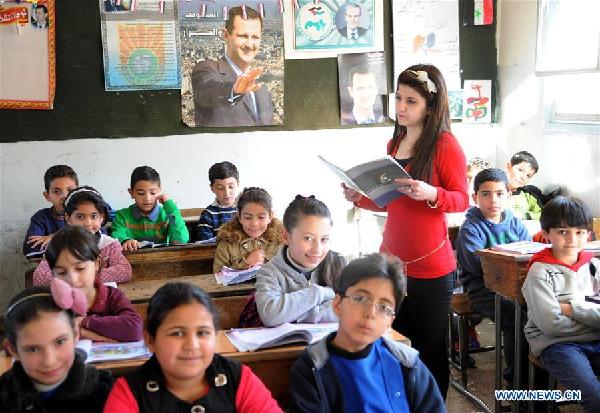Empowering women as clean energy leaders
- By Julia Brous Sard
 0 Comment(s)
0 Comment(s) Print
Print E-mail China Daily, March 8, 2016
E-mail China Daily, March 8, 2016
|
|
|
A Syrian teacher gives children a class at a school in Damascus, capital of Syria, on March 7, 2016. International Women's Day (IWD), originally called International Working Women's Day, is celebrated on March 8 every year. (Xinhua/Ammar) |
Our rapidly growing world is facing the greatest resource pressures in history. With the global population expected to reach 8.5 billion by 2030, the increasing demands for energy-necessary for poverty alleviation and growth-are being met with calls for sustainable consumption and environmental consideration of finite resources (UN, 2015).
The landmark achievements of the Paris Agreement on climate change and the new Sustainable Development Goals underscore 2015 as a momentous year for global progress toward international, collaborative efforts that support human development and sustainability.
Across high-level processes and at the local level, the pivotal experiences of women-as those most vulnerable to energy poverty and as the ones predominantly responsible for household energy provision make gender a key, yet often overlooked, consideration in the development of sustainable solutions in these areas.
Across most social contexts, women hold traditional care roles within the domain of the home that make them responsible for household energy management. In areas where poverty and resource scarcity prevail, women face daily obstacles in obtaining the fuel necessary for subsistence activities, such as cooking and heating. The burden of these obstacles from personal security risks to negative health externalities-is largely borne by women and represents a significant source of gender inequality.
Yet it is also because of women's strong roles within the home and community domains that they tend to have a stronger influence over energy habits than men. A recent study from Europe examining consumption patterns between men and women found that single women consume about 22 percent less energy than single men and are more likely to adopt energy conservation efforts (equalclimate.org).
With women playing a positive and influential role as energy managers at the household and community level, their involvement across all stages of the energy value chain can expand the scale and quality of sustainable energy initiatives. Simultaneously, it is critical for all aspects of energy planning and policymaking to consider gender dimensions because so many of these decisions have a direct impact on the lives of women. One of the best ways to achieve the integration of these critical voices and perspectives is through the empowerment of women as leaders in this sector.






